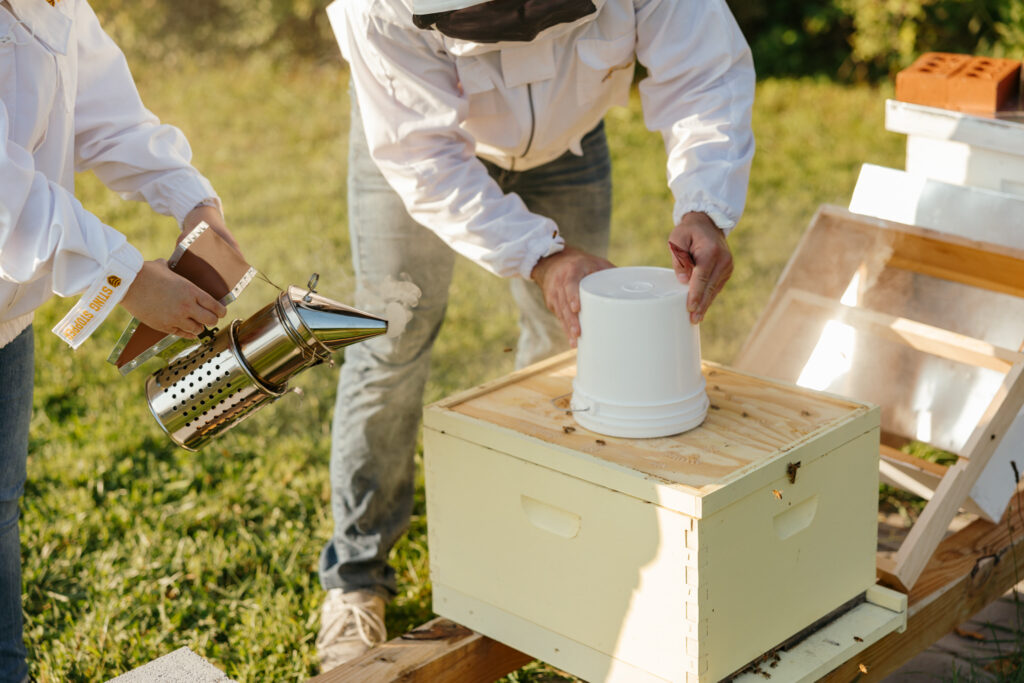As the leaves begin to turn golden here in the Appalachian Highlands of Washington County, VA, I know it’s time to start getting our honeybee hives ready for winter. It’s October, and the chill in the air serves as a reminder that soon, our bees will face their most challenging season. My job, as their caretaker, is to make sure they’re strong and well-prepared to make it through the cold months ahead.
At Apiary Select, we take pride in how we treat our bees, just as we do with the honey they produce. Keeping the hives healthy during winter is crucial, not only for the survival of the bees but also for ensuring they’re strong enough in the spring to make the honey flow.
Preparing the Hives to Make Next Year’s Local Honey

One of the first things I do this time of year is to assess the strength of each hive. A healthy hive has plenty of bees and enough stored food to sustain them through the winter. This stored food allows them to stay nourished during the months when flowers are no longer blooming and it’s too cold to leave the hive.
Honeybees in nature rely on their stored honey reserves to get them through nectar dearth periods, especially the winter. Since we take most of that honey to enjoy ourselves and share with you, we feed them simple syrup made of table sugar and water to replace the honey we’ve taken. We also provide them with extra sugar and nutrients to make sure they have the energy to stay warm all winter.
Protecting the Bees from the Cold
Bees are remarkable creatures. As the temperatures drop, they form a tight cluster inside the hive to stay warm, with the queen at the center. Our winters don’t typically get cold enough that the bees need help staying warm, but we do help them stay dry by ensuring we have good equipment and good ventilation in the hives. Condensation that forms on the inside of the hive can drip on the cluster and make it impossible for the bees to survive, but good ventilation can help reduce moisture.
Finally, our apiary is located next to wind breaks to help further protect the bees from the harshest winter conditions.
Ensuring a Healthy Hive
A strong, healthy hive has the best chances of surviving winter. Before the first frost, I check the bees for signs of pests or diseases, ensuring they’re not carrying anything that could weaken the colony. If necessary, we provide approved natural treatments to reduce threats and stressors, staying true to our mission of responsible, transparent farming.
Throughout the winter, I’ll check in on the hives as needed, but mostly, I let the bees do what they do best—taking care of themselves. Our role is to provide the support they need to make it through the colder months, so come spring, they’ll be ready to get back to work, gathering nectar and producing more of the raw, all-natural honey that we’re proud to share with you.
A Season of Rest and Renewal
For our bees, winter is a time of rest. They’ve worked hard all summer long, gathering nectar from the wildflowers and trees that bloom in Blue Ridge Mountains. The honey they produce is a reflection of this land—pure, raw, and bursting with the flavor of the Appalachian Highlands.
As we prepare for the coming months, it’s always a humbling reminder of the partnership we share with these amazing creatures. We’re here to support them, and in return, they provide us with one of nature’s sweetest and most wholesome gifts.
Thank you for being part of our journey here at Apiary Select. When you enjoy a jar of our honey, you’re not just supporting local farming—you’re supporting the bees and the natural cycles that keep our world thriving. As we move into winter, we look forward to sharing more stories with you and continuing to bring you honey that’s as pure and honest as the land it comes from.
Stay warm, and we’ll see you in the spring!
